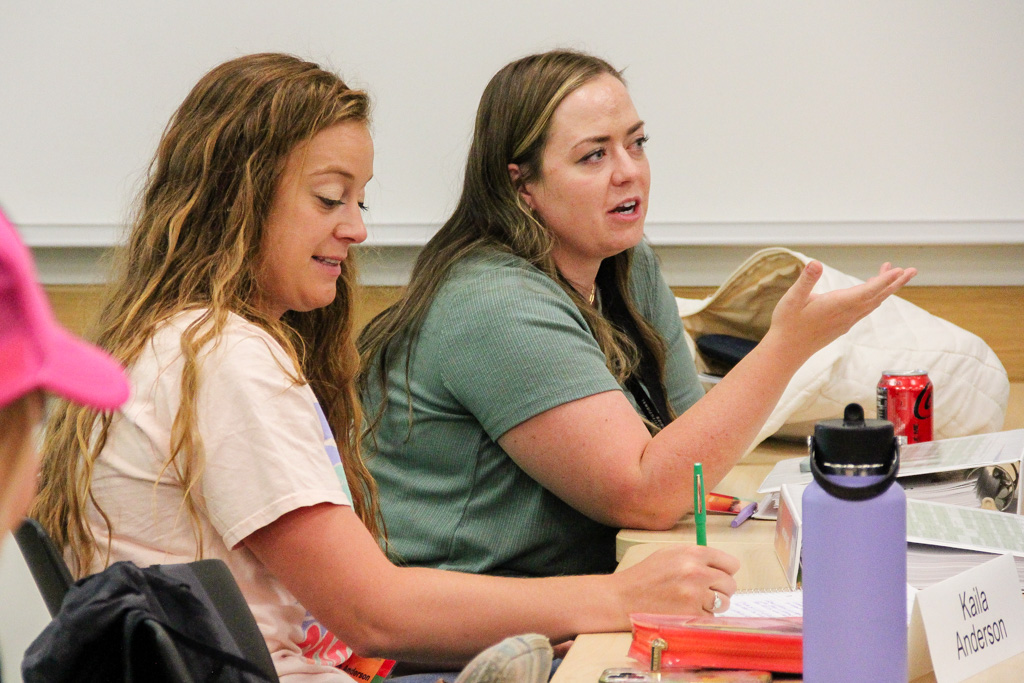By Hank McIntire
See photos here

Teacher participants at the 2024 Constitutional Literacy Institute held at Utah Valley University June 24–28, 2024, and hosted by the Center for Constitutional Studies at Utah Valley University.
Who and Why
The Center for Constitutional Studies (CCS) held its annual summer Constitutional Literacy Institute (CLI) June 24–28, 2024, on Utah Valley University campus.
Fifty elementary- and secondary-school teachers from Utah, Idaho, and Texas attended this year’s course, which is in its fifth year.
The purpose of CLI is to provide education, resources, and experiences for teachers to increase personal constitutional literacy and then to help their students do the same.
“The rising generation of citizens and leaders need a broad understanding of political thought and practices critical to the perpetuation of constitutional government, ordered liberty, and the rule of law,” said Scott Paul, executive director of CCS and organizer of CLI. “The Constitutional Literacy Institute is a tool for teachers to do just that.”
Top-Tier Presenters
Constitutional scholars from CCS and Oxford University, as well as other experts from public life, provided instruction to teachers through lectures, discussions, scenarios, and off-campus activities. Among the presenters were these:
Relevant Content
Presenters provided content or shared pedagogical strategies on a number of topics, such as—
After Hours
Evening activities included excursions at the Brigham Young University Museum of Art and Moon’s Rare Books in Provo, where they experienced modern art in the context of constitutional issues and had up-close views of documents and artifacts related to the American founding, respectively.
Some comments from participants on the after-hours trips:
Teacher Takeaways
After an intense week of study, discussion, and discovery, teachers reflected on what they learned at CLI and what they plan to share with their students in the classroom.
“It’s been a feast of fascinating learning,” said Jared Collette, who teaches U.S. History and Utah Studies at Corner Canyon High School in Draper, Utah. “Being on the front lines can be exhausting, and sometimes I feel discouraged. But this course has given me a bird’s-eye view."
“What I’ve seen this week has helped me get my bearings, and it rekindled the fire that helped me start my teaching career,” Collette added.
A teacher of fifth-graders at Odyssey Elementary in Ogden, Utah, Ashley Amundsen had a chance to experience some of the overwhelm her young students feel when they try to unpack and understand the Founding.
“I felt validated when they talked about how complex and confusing this can be,” she said, referring to the documents the Framers used as a basis for their work. “The Constitution wasn’t done in a day.”
“I teach at a Title 1 school, where there are lots of immigrants,” Amundsen continued. “Being able to teach my students not only their civic responsibilities but also their privileges, rights, and protections is really empowering because I don’t know how much their parents know about their new country.”
Sarah Leavitt teaches history at Salem Hills High School, in Salem, Utah, and is a veteran in the classroom. “This has been the best conference that I’ve been to in 14 years of teaching,” she said. “And I can say that without hesitation because this training brought people from across the state who don’t normally interact.”
Along with the great content presenters provided, Leavitt came away with tools to help her students engage and interact with each other and in the public square.
“We learned about the concept of listening, things that make you a decent human being,” she explained. “Seeking to prove you’re right instead of trying to understand—that is a problem in our system. We say, ‘I hate you or I like you because of your political stance.’ Now I understand how to help my students get to a solution. If our nation is going to survive under this constitution, we have to have that.”
Impact on Students
As personally enlightening as the course was for the teachers, they all agreed that the real impact will be seen in how their students follow the example of the Founders in blending passion for their views with civility and compromise.
“Our students are bombarded with so much information,” said Collette. “Some became apathetic, and some are super certain that they are right. We can inspire engagement without overzealousness.”
“I want to empower them to be active members of their community,” added Amundsen. “If they don’t have a model of success, I can give them tools to aspire to. I want to teach my students how to be good people and give them a better reason why that is important and help them grow in ways that I didn’t know were possible.”
“Rebuilding trust is such a huge need today,” said Leavitt. “We get to shift mindsets in the growing generation and have a ripple effect that will allow us to have more peace and understanding in our country.”